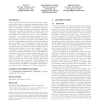Free Online Productivity Tools
i2Speak
i2Symbol
i2OCR
iTex2Img
iWeb2Print
iWeb2Shot
i2Type
iPdf2Split
iPdf2Merge
i2Bopomofo
i2Arabic
i2Style
i2Image
i2PDF
iLatex2Rtf
Sci2ools
142
click to vote
MOBIHOC
2008
ACM
2008
ACM
Complexity in wireless scheduling: impact and tradeoffs
It has been an important research topic since 1992 to maximize stability region in constrained queueing systems, which includes the study of scheduling over wireless ad hoc networks. In this paper, we propose a framework to study a wide range of existing and future scheduling algorithms and characterize the achieved tradeoffs in stability, delay, and complexity. These characterizations reveal interesting properties hidden in the study of any one or two dimensions in isolation. For example, decreasing complexity from exponential to polynomial, while keeping stability region the same, generally comes at the expense of exponential growth of delays. Investigating trade-offs in the 3-dimensional space allows a designer to fix one dimension and vary the other two jointly. For example, incentives for using scheduling algorithms with only partial throughput-guarantee can be quantified with regards to delay and complexity. Tradeoff analysis is then extended to systems with congestion control t...
Certain Scheduling Algorithms | Future Scheduling Algorithms | MOBIHOC 2008 | Scheduling Algorithms | Wireless Networks |
Related Content
| Added | 24 Dec 2009 |
| Updated | 24 Dec 2009 |
| Type | Conference |
| Year | 2008 |
| Where | MOBIHOC |
| Authors | Yung Yi, Alexandre Proutiere, Mung Chiang |
Comments (0)

